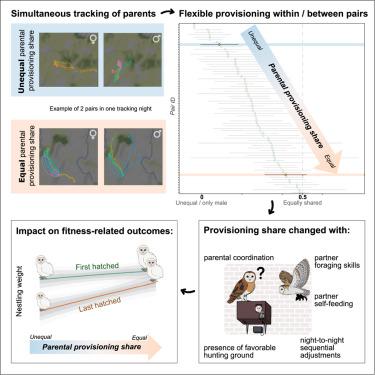Real-time context-dependent cooperation in parental provisioning reveals fitness payoffs in barn owls
IF 4.1
2区 综合性期刊
Q1 MULTIDISCIPLINARY SCIENCES
引用次数: 0
Abstract
Parental cooperation in species with extended biparental care is essential for offspring survival, yet real-time negotiation and coordination in the wild remain poorly understood. We simultaneously Global Positioning System (GPS)- and accelerometer-tracked 68 breeding pairs of barn owls (Tyto alba) during chick rearing, quantifying parents’ hunting effort, prey deliveries, self-feeding, nest attendance, and partner encounters. Within pairs, parental investment was highly plastic, with low repeatability of nightly provisioning shares. Females increased provisioning when males underperformed or when foraging habitat was likely poor. Parents synchronized foraging schedules and nest visits, exhibiting turn-taking-like coordination; pairs that shared provisioning more equally foraged in parallel overnight and met frequently at the nest. We detected sequential, between-night adjustments, whereby effort on one night influenced provisioning the next. Pairs maintaining more equitable care achieved higher survival and growth in their later-hatching nestlings. Our findings demonstrate how high-resolution biologging reveals dynamic behavioral mechanisms underpinning flexible biparental care under ecological variability.

亲代供给中的实时情境依赖合作揭示了仓鸮的适应性回报
在双亲代养育的物种中,亲代合作对后代的生存至关重要,但在野外的实时协商和协调仍然知之甚少。我们同时用全球定位系统(GPS)和加速度计跟踪了68对仓鸮(Tyto alba)的育雏过程,量化了父母的狩猎努力、猎物的运送、自我喂养、窝的出场率和伴侣的相遇。在配对中,亲代投资具有高度的可塑性,夜间供应份额的可重复性较低。当雄性表现不佳或觅食栖息地可能较差时,雌性会增加供给。父母同步觅食时间表和访巢,表现出类似轮流的协调;共享食物的配对更平均地在夜间平行觅食,并经常在巢穴见面。我们检测到连续的夜间调整,即一个晚上的工作影响下一个晚上的供应。维持更公平照料的成对雏鸟在后期孵化的雏鸟中获得了更高的存活率和生长速度。我们的研究结果表明,高分辨率生物学揭示了生态变异性下灵活的双代育儿的动态行为机制。
本文章由计算机程序翻译,如有差异,请以英文原文为准。
求助全文
约1分钟内获得全文
求助全文
来源期刊

iScience
Multidisciplinary-Multidisciplinary
CiteScore
7.20
自引率
1.70%
发文量
1972
审稿时长
6 weeks
期刊介绍:
Science has many big remaining questions. To address them, we will need to work collaboratively and across disciplines. The goal of iScience is to help fuel that type of interdisciplinary thinking. iScience is a new open-access journal from Cell Press that provides a platform for original research in the life, physical, and earth sciences. The primary criterion for publication in iScience is a significant contribution to a relevant field combined with robust results and underlying methodology. The advances appearing in iScience include both fundamental and applied investigations across this interdisciplinary range of topic areas. To support transparency in scientific investigation, we are happy to consider replication studies and papers that describe negative results.
We know you want your work to be published quickly and to be widely visible within your community and beyond. With the strong international reputation of Cell Press behind it, publication in iScience will help your work garner the attention and recognition it merits. Like all Cell Press journals, iScience prioritizes rapid publication. Our editorial team pays special attention to high-quality author service and to efficient, clear-cut decisions based on the information available within the manuscript. iScience taps into the expertise across Cell Press journals and selected partners to inform our editorial decisions and help publish your science in a timely and seamless way.
 求助内容:
求助内容: 应助结果提醒方式:
应助结果提醒方式:


